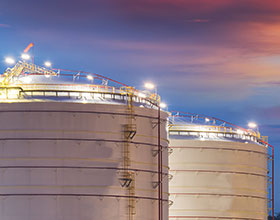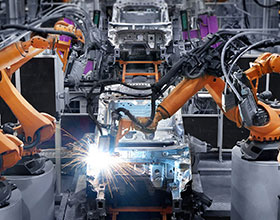Asset Reliability Solutions

At a Glance
- Reliability programs to help you lower maintenance costs and minimize downtime
- Reliability-based maintenance (RBM) and best practices for effective Asset Management
- Global EAM system expertise across multiple industries and market sectors
- Award-winning Asset Criticality Ranking tool to identify and prioritize your most critical assets
We recognize that one size hardly fits all. Some of our customers have well-developed programs and workflows and want to move up to another level of performance. Others want to improve performance by adding an element to their program.
Our Asset Reliability team will work carefully with yours to understand your unique needs and develop an implementation plan with clear tasks, milestones and deliverables.
Services to Optimize Asset Integrity and Reliability
Our Asset Reliability Program has been deployed around the globe across industry verticals. When fully implemented, the following elements constitute a global best-practice Asset Reliability Program: Computerized Maintenance Management System (CMMS) Utilization, Inventory Management, Organizational Readiness, Performance Optimization, Reliability Strategy and Work Management. To help our customers improve asset performance and reliability, we provide a full suite of services:
Featured Product Solution: IBM Maximo Accelerator
Improve visibility into asset performance. Our RBM Accelerator integrates seamlessly with the Maximo enterprise asset management system, allowing you to capitalize on data for enhanced reliability. GenesisSolutions is an IBM Gold Business Partner offering a budget friendly implementation with immediate return on investment.
Asset Criticality Ranking
Our service model is built on a
- Evaluation of how asset failures impact organizational performance
- Provision of detailed profiles of characteristics that makes each asset critical
- Allowance for systematic ranking of assets for prioritization efforts
EAM Master Planning
Our comprehensive Enterprise Asset Management (EAM) Master Planning process involves applying a DMAIC approach (Define, Measure, Analyze, Improve and Control), which is a Six Sigma quality management tool. We can assist your maintenance organization with EAM master planning using our continuum chart showing progression through the following operating states toward a state of continuous improvement: Reactive (repair after failure), Planned (repair before failure), Predictive (measure and repair), Reliability (not only repair, but improve) and Enterprise (improve and sustain).
Failure Mode Effects Analysis (FMEA)
The purpose of FMEA is to provide a structured, rigorous method to identify asset functions, asset functional failures, failure modes that cause functional failure, failure effects, and the proper course of action to avoid or reduce failure effects. GenesisSolutions incorporates FMEA as a tool within the
Master Asset List (MAL)
Asset-intensive businesses must know which work orders to address first at any given time.
MRO Supply Chain Optimization
The maintenance, repair and operating (MRO) supply chain is a complex web of interconnected companies, business processes and physical storerooms–all designed to supply the right spare parts at the right time in the right place. The supply chain offers many opportunities for performance and cost improvement. We can help identify opportunities to lower the total cost of ownership for MRO items. Our reliability team can provide assistance in the following areas: strategic sourcing and supplier rationalization, business process re-design, supply network analysis and re-design, stores inventory optimization, MRO data normalization, supplier performance management and MRO inventory management.
Cost reduction opportunities in the MRO supply chain can be significant. We typically see a 20% cost reduction opportunity between leading-edge practices and unoptimized conditions.
Planning and Scheduling
We have decades of experience building, operating and improving planning and scheduling processes and the elements that support it. Our reliability professionals bring cross-industry best practices and a methodology to educate, train and implement operations and maintenance to achieve maximum gains. Our services include backlog management, work prioritization, outage planning, post-outage reviews and developing systems usage guides for improved asset maintenance and management.
Preventive Maintenance Optimization
Our reliability professionals bring cross-industry expertise to preventive maintenance (PM) optimization. Our approach is to work closely with our customers' teams to evaluate all inputs to an effective PM program,
Predictive Maintenance Program
One of the most effective ways to improve critical asset reliability (uptime) and reduce maintenance cost is to change from fixed time maintenance to
A predictive maintenance program can improve equipment availability, uptime, productivity and product quality, and reduce cost, all at the same time. The reliability and cost savings are substantial (15-20% or more) compared to fixed-time maintenance.
Reliability Based Maintenance
Our reliability engineers are experts in applying a Reliability Based Maintenance approach using the following six steps: identifying and prioritizing critical assets, optimizing the PM program, analyzing spare parts, monitoring reliability analytics and performing a root cause analysis. Through RBM, we can help you determine the predictive approach that will deliver the most reliability for the least cost and evaluate existing maintenance programs to identify and eliminate non-value-added and intrusive tasks that contribute to downtime.
Root Cause Analysis (RCA)
Through our parent company, ABS Group, we can provide a complete training solution for your organization's investigation and root cause analysis (RCA) needs. ABS Group offers training for root cause analysts, front-line supervisors supporting investigations and managers performing reviews. The Incident Investigation and Root Cause Analysis team has provided investigation and RCA training to more than 10,000 individuals through worldwide, multi-language public and onsite training courses and webinars. ABS Group also provides ongoing support through online resources, Root Cause Analysis Handbook and program support services.
Public Training
Root Cause Analysis to Improve Asset Reliability
This public training course will demonstrate how to use the SOURCE™ root cause analysis (RCA) methodology as a powerful tool for your asset management and equipment reliability program for investigating on-going asset incidents and chronic failures. This methodology is a critical step in the execution of an effective Reliability Based Maintenance (RBM) program to drive continuous improvement throughout your maintenance organization.
Safeguard Robustness for Operational Excellence
Our Critical Asset Safeguard Evaluation (CASE) tool helps customers determine if their most critical assets are being managed to an acceptable level of residual risk. This applies to assets that have been newly installed and commissioned or legacy assets that have been in operation for extended periods. All assets have an inherent risk profile and our goal as reliability professionals is to determine if our existing safeguards adequately address the potential impact of those risks to health, safety and the environment, regulatory compliance, as well as specified business objectives.
Spare Parts Analysis (SPA)
One of the cornerstones of a leading-edge reliability program is a fully developed and streamlined spare parts program. We can help your team manage and optimize spare parts stocking and realign your parts usage and cost in these areas: bill of materials, surplus inventories, purchase costs, spot buys, obsolete inventory and storeroom operations.
Workflow Optimization
We take into consideration the requirements of our customers' CMMS and integrate the appropriate data entry, review and measurements necessary to achieve the expected maintenance goals for workflow optimization.
Work Management Processes
The full benefit of EAM can only be realized if maintenance is effectively identified, planned, scheduled, executed and evaluated. We understand that all elements of work management must be functional for any to be sustainable. Our work management improvement process begins with assessment of current practices, which are captured in process maps that serve to illustrate specific opportunities relative to best practices. We then examine existing documentation, interview stakeholders, shadow personnel throughout the maintenance workflow and develop a master improvement plan based on proven best-in-class work management practices. This plan is tailored to our customers' specific business needs.
By providing a customized, lean, exacting approach toward realizing full organizational potential, we will work closely with your staff until the a sustainable model is developed and implemented.
Following master plan development, we are prepared to provide a full array of work management implementation support services, from remote consultation to fully embedding with your organization in a staff augmentation role, until your organization's work flows are optimized for maximum efficiency and profitability.




